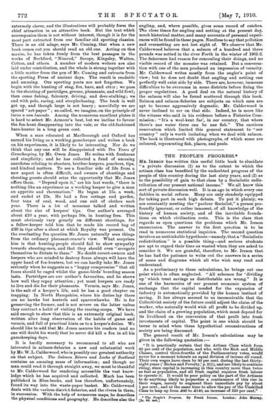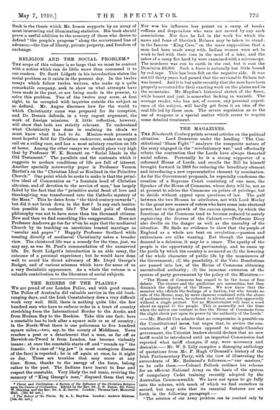THE PEOPLE'S PROGRESS.*
Ma. IRESON has written this useful little book to elucidate " a private discussion (1) as to the extent to which the
artisan class has benefited by the undoubted progress of the people of this country during the last sixty years, and (2) as to the possibility of gain to that class by a Socialistic redis- tribution of our present national income." We all know this sort of private discussion well. It is an age in which every one dabbles in social reform. Many are only slenderly equipped for taking part in such high debate. To put it plainly, we are constantly meeting the "parlour Socialist," a person pro- foundly ignorant, or rather innocent, of all knowledge of the history of human society, and of the inevitable founda- tions on which civilisation rests. This is the class that regards as open questions the problems which Mr. Ireson enumerates. The answer to the first question is to' be read in numerous statistical inquiries. The second question involves an unthinkable hypothesis—namely, that a "Socialistic
redistribution " is a possible thing—and serious students are apt to regard their time as wasted when they are asked to
consider it. We are grateful, therefore, to Mr. Ireson that he has had the patience to write out the answers in a series of sums and diagrams which all who wish may read and understand.
As a preliminary to these calculations, he brings out one point which is often neglected. "All schemes for dividing up' which treat savings as distributable are wrong." It is one of the harmonies of our present economic system of exchange that the capital needed for the expansion of industry is automatically provided by the human instinct of saving. It has always seemed to us inconceivable that the Collectivist society of the future could adjust the claim of the worker, who naturally would wish all profit to be divided up, and the claim of a growing population, which must depend for its livelihood on the conversion of that profit into fresh investments of capital. The point is one which should be
borne in mind when these hypothetical reconstructions of society are being discussed.
The general result of Mr. Ireson's calculations may be given in the following quotation:— "It is practically certain that the Artisan Class. which form 65 per cent of the population, and who, with the Rich and Middle Classes, control three-fourths of the Parliamentary votes, would never for a moment tolerate an equal division of income all round. Their own wages have risen by 50 per cent. during the last thirty- eight years (` Riches and Poverty,' p. 311), and are likely to continue rising, since capital is increasing in this country more than twice as fast as population, and all fresh capital requires fresh labour to operate it. It would be poor policy on the part of the Artisans to do anything likely to jeopardise a continuance of this rise in their wages, merely to augment their immediate pay by about 1 per cent., and at the same time to allow the pay of the Unskilled Class to leap up from .640 to .46140, an increase of 250 per cent." - !-The Ponole's Ptogross. By Prank Ireson. London: John Marry. [3a. 6d. net.]
Such is the thesis which Mr. Ireson supports by an array of most interesting and illuminating statistics. His book should prove a useful addition to the armoury of those who desire to defend " the people's progress" along the accustomed line of advance,—the line of liberty, private property, and freedom of exchange.











































 Previous page
Previous page